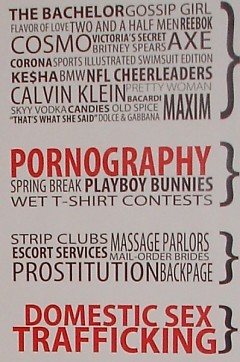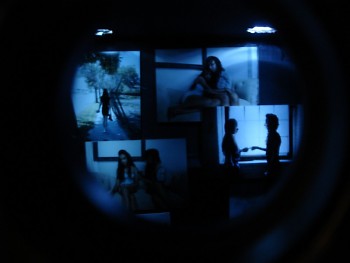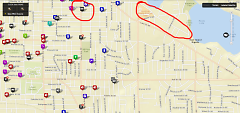The Manasseh Project’s first-hand experience with human trafficking has shaken the project's founders awake to the fact that something ugly exists in our city and it needs to go away. Human trafficking is here, in Grand Rapids.
In the Fall of 2010 Wedgwood Christian Services formed The Manasseh Project as an outreach ministry dedicated to ending sexual exploitation of the younger people of our community. The project now has an ArtPrize entry assisting in raising awareness, a nice mention in the Huffington Post and was featured as a top image on MLive from day one of ArtPrize.
There are a number of separate public presentations throughout the fall at different venues around the city and Wealthy Theatre played gracious host on September 28. Here, local students unveiled the projects they had worked on in conjunction with industry professionals and Wedgwood.
First up was a live spoken word piece set to video. Locally shot, it was narrated by local beat poet and author Joe Gofoe II. Though well produced, it contained some raw images of a girl taken in by the streets and her resulting suffering because of that reality. The crowd hushed a bit as the film ended and it seemed an alertness was now present that may have not been before.
Luke Hassevoort then presented a photo and video essay titled "What if the story being told is a lie?" which focused on Hassevoort’s view of mainstream media's continual attempts to influence our dollar and physical perception by offering a Dove commercial and other ads he perceives as being suggestive. His lobby display held a sign connecting the dots from Axe body spray to domestic sex trafficking in four easy steps.
Up next was Leslie King who spoke about her two-decade long experience as a prostitute in Grand Rapids. She explained how she became involved in prostitution, her crack and alcohol abuse along the way and her final triumph of breaking free. She spoke of her attempted suicide and a call out to God. King was unafraid of baring all as she shared her deeply intimate story with the half full theatre. Two hundred people sat quietly and respectfully while listening to her testimony and only two times did the quiet break during her presentation: when her many mug shots were projected onto the theatre's massive screen and when an enthusiastic applause broke out from her mention of reconnecting with God.
After the show a display in the lobby showed images dedicated to those who have suffered along the way while in search of a solution. Their struggles were represented through intimate, low-light pictures viewed underneath a veil and inside a box.
Manasseh's reach is intended to be wide as they have identified all school-age kids, all branches of the judicial and educational systems and business communities as areas in need of enlightening. There is a suggestion to actually build or open new shelters or charitable organizations to accommodate the victims of these crimes.
Admirable ideas but not even the police can police everything all the time.
According to city-data.com, there were 400 rapes in Grand Rapids from 2000-2010. From April 4 to October 1 of this year there have been 115 sex crimes reported in Grand Rapids and passed along via crimemapping.com. There were five crimes reported in Grand Rapids for every one in East Grand Rapids and Michigan as a whole has averaged over 50,000 violent crimes reported each year for over 40 years. Of course, these figures do not include crimes or incidents that for any number of reasons did not get reported, so the totals may even be higher than published.
Are these dangerous times in Grand Rapids?
Surely we do not live in a culture of fear, but we must stay safe. How do we stop human trafficking? How do we stop rape? The reasons for the acts must be found at a basal level and identified before either can manifest. The Manasseh Project is helping to open a dialog about this very difficult subject by offering a public platform and sharing the few answers they have learned along the way.
The Rapidian, a program of the 501(c)3 nonprofit Community Media Center, relies on the community’s support to help cover the cost of training reporters and publishing content.
We need your help.
If each of our readers and content creators who values this community platform help support its creation and maintenance, The Rapidian can continue to educate and facilitate a conversation around issues for years to come.
Please support The Rapidian and make a contribution today.


